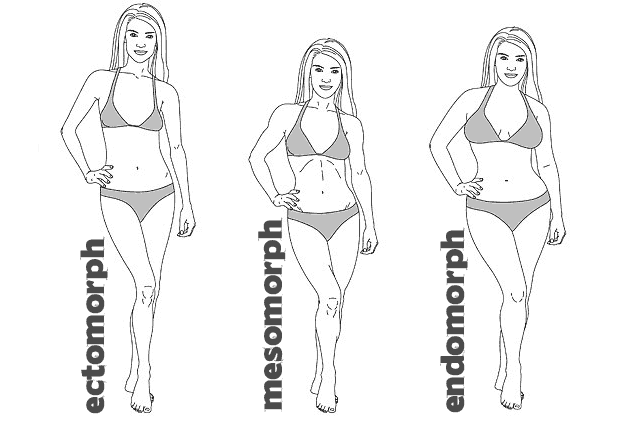
The human body is like an automobile; given the right fuel (food and nutrients) along with proper care, handling and recovery it has the ability to perform like a finely tuned race car. With abuse, disuse and improper nutrition it can very well find itself prematurely on route to the junkyard.
The components of the machine will vary greatly from individual to individual. You must experiment and fine tune to determine what works best for you.
A while back I wrote the article Train Right for your Body Type which brought a lot of much needed attention to the fact that women need to work out differently based on their body type. Well, the same can definitely be said for pre and post workout nutrition.
While food is both fuel and recovery, the ectomorph (“Cardio Queen”), endomorph (“Hearty Girl”), and mesomorph (“Natural Athlete”) will all have varying needs in addition to the type of training (exercise) they are doing.
Use the following as general guidelines not a carved in granite blueprint to develop a pre and post workout nutritional strategy that works best for you, your goals, what you are training for and your current state of health and fitness.
All three body types can be overweight or underweight; this article will focus on the general tendencies of each type. If you fall outside these generalizations or have significant health challenges modifications will need to be made.
- The Endomorph: higher fat, moderate protein, lower carbohydrates
- The Mesomorph: balanced, moderate protein, fat and carbohydrates
- The Ectomorph: higher carb, moderate protein, lower fat
Body Type Guidelines
- % of Body Fat: the higher your percentage of body fat the lower tolerance you have for carbohydrates. You need to transition to a lower body fat over time with proper exercise and nutrition. Your post workout meal should be primarily to stabilize your blood sugar. A leaner person can tolerate carbohydrates far better and should have more post workout.
- Gender: as a general rule men have more lean mass (muscle) and can generally eat more carbs. There are exceptions to this rule–highly muscled females/deconditioned poorly muscled males.
- What Are You Training For (WAYTF): What you are training for and what your training age (experience) will definitely play into the equation. Intensity is relative to the time domain. Long slow distance is not a change of intensity but a state of homeostasis.
- Type of Training: different fuel for different types of training. Are you primarily doing a CNS Stimulant workout (strength training) or Cellular Breakdown (metabolic conditioning) or a bit of both? Plan your nutrition and strategize accordingly.
- Sensitivities: we vary greatly, experiment, feel what works, you will need to learn by trial and error what works best for your genetics.
- Timing of meals: for strength training you should be able to eat up to 15 -30 min prior to your workout without any ill effects. For metabolic conditioning some can train fasted or within 2 hours allowing time for digestion.
Realizing there are many factors that play into this let’s take a look at some Pre and Post workout meal and snack ideas. . .
Pre Workout Nutrition
Fasted: if it works for you, do it. It doesn’t for me (I am a meso/endo) maintaining my weight. Some people (primarily endos and those overweight) do well in a fasted state for metabolic conditioning or long slow distance. I don’t recommend it for strength training.
30 min to 2 hours prior: up to 30 min for strength training, 60 min to 2 hours for metabolic conditioning. A meal consisting of protein, fat and carbohydrates in macronutrients (proportions) suitable to your body type/goals.
Example: 2-3 hard boiled eggs, piece of fruit; chicken/fish/fowl, veggies, sweet potato/other root or tuber
Post Workout Nutrition
Gain/maintain weight/small amount to lose: 40% protein, 60% carbs, low in fat. Why low in fat? Fat slows the absorption process; post wod is an exception–you want those nutrients sucked up rapidly.
Examples: Nature’s “protein shake” and my favorite — 1-2 cups raw milk and a sweet potato or banana. I prefer to have a liquid/easily digestible protein and a source of carbs immediately following my training, and a whole food meal a couple of hours later.
High % of body fat/insulin resistant or metabolically challenged: higher protein/mod fat/low carb; goal is to stabilize blood sugar and continue to burn stored body fat
Examples: homemade kefir is an excellent choice post workout; coconut milk smoothie with a few berries; hard boiled eggs w/ veggies.
2 hours post workout: meal of protein/carb/fat relative to the proportions appropriate for your body type/goals.
Examples:
Ectos/Mesos: Meat/fish/fowl, starch (sweet potato, white potato, yucca or other roots/tubers), vegetables and healthy fats in proportions suitable to body type/goals.
Endos: Meat/fish/fowl, vegetables and healthy fat in proportions suitable to body type/goals.
These are merely general guidelines for pre/post workout nutrition. It is imperative to experiment and find what works for you. And remember these pre/post wod meals are crossing the t’s and dotting the i’s on an already solid nutrition plan–they aren’t the focus of a solid nutrition plan.








“Gain/maintain weight/small amount to lose: 40% protein, 60% carbs, low in fat. Why low in fat? Fat slows the absorption process; post wod is an exception–you want those nutrients sucked up rapidly.” I think I am reading this wrong? Does this mean if you want to gain weight, don’t eat a lot of fat after working out because it slows absorption and you want to absorb fast after working out? or do I have this backwards?
I was just reading up on it this week. I think it’s accurate and relevant.